General Discussion
Related: Editorials & Other Articles, Issue Forums, Alliance Forums, Region ForumsBill Black: How Hayek Helped the Worst Get to the Top in Economics and as CEOs
By Bill Black, the author of The Best Way to Rob a Bank is to Own One and an associate professor of economics and law at the University of Missouri-Kansas City. Originally published at New Economic Perspectives
Libertarians are profoundly anti-democratic. The folks at Cato that I debate make no bones about their disdain for and fear of democracy. Friedrich von Hayek is so popular among libertarians because of his denial of the legitimacy of democratic government and his claims that it is inherently monstrous and murderous to its own citizens. Here’s an example from a libertarian professor based in Maryland.
When government uses its legal monopoly on coercion to confiscate one person’s property and give it to another, it is engaging in what would normally be called theft. Calling this immoral act “democracy,” “majority rule” or “progressive taxation” does not make it moral. Under democracy, rulers confiscate the income of productive members of society and redistribute it to various supporters in order to keep themselves in power.
In order to finance a campaign, a politician must promise to steal (i.e., tax) money from those who earned it and give it to others who have no legal or moral right to it. There are (very) few exceptions, but politicians must also make promises that they know they can never keep (i.e., lie). This is why so few moral people are elected to political office. The most successful politicians are those who are the least hindered by strong moral principles. They have the least qualms about confiscating other peoples’ property in order to maintain their own power, perks, and income. In his bestselling 1944 book, ‘The Road to Serfdom,’ Nobel laureate economist F.A. Hayek described this phenomenon in a chapter (10) entitled “Why the Worst Get on Top.”
But von Hayek’s critique of democratic government has proven to be the most monstrous blood libel of the post-World War II era – falsely declaring that democratic government must end in tyranny and the mass murder of its own people.
The political scientist Herman Finer … denounced (The Road to Serfdom) as “the most sinister offensive against democracy to emerge from a democratic country for many years.”
The economist Paul Samuelson, in a reminiscence of Hayek published last December, was more dismissive still. “Where are their horror camps?’ he asked, referring to right-wing bugaboos like Sweden, with its generous welfare spending. Almost 70 years after Hayek sounded his alarm, ‘hindsight confirms how inaccurate its innuendo about the future turned out to be.”
Why the Worst Get on Top – in Economics
Economists claim that their work should be evaluated based on predictive success. Von Hayek was made a Nobel Laureate in 1974, three decades after his prediction that democratic states were headed to tyranny and mass murder of their own citizens. In those three decades of experience in the nations he focused on (Western Europe, the U.S., Canada, Australia, and New Zealand) – and the forty years since his award – this happened in zero nations. He is batting zero for 70 years in roughly 30 nations with, collectively, thousands of elections. What he claimed was inevitable has never occurred. .......................(more)
The complete piece is at: http://www.nakedcapitalism.com/2014/06/bill-black-hayek-helped-worst-get-top-economics-ceos.html
Octafish
(55,745 posts)The Banksters would have to pay the $16 trillion back, every penny.
sabrina 1
(62,325 posts)So we are told ... lol!
I agree, he SHOULD have been Sec of the Treasury. But the we got foxes at Treasury, guarding the hen house instead.
Octafish
(55,745 posts)In Black's case, the word is "Integrity." That scares the heck out of the bastards on Wall Street and their toadies in Washington.
Dr. Black is a forensic economist who helped put thousands of Savings & Loan crooks behind bars in the 80s and 90s. That Trillion dollar bailout was peanuts compared to the Banksters of '08. He terms the phenomenon, where the officers of a financial institution rip off their depositors and shareholders, "Control Fraud."
The Two Documents Everyone Should Read to Better Understand the Crisis
by William K. Black
Assoc. Professor, Univ. of Missouri, Kansas City;
Sr. regulator during S&L debacle
February 25, 2009 10:31 AM
As a white-collar criminologist and former financial regulator much of my research studies what causes financial markets to become profoundly dysfunctional. The FBI has been warning of an "epidemic" of mortgage fraud since September 2004. It also reports that lenders initiated 80% of these frauds.1 When the person that controls a seemingly legitimate business or government agency uses it as a "weapon" to defraud we categorize it as a "control fraud" ("The Organization as 'Weapon' in White Collar Crime." Wheeler & Rothman 1982; The Best Way to Rob a Bank is to Own One. Black 2005). Financial control frauds' "weapon of choice" is accounting. Control frauds cause greater financial losses than all other forms of property crime -- combined. Control fraud epidemics can arise when financial deregulation and desupervision and perverse compensation systems create a "criminogenic environment" (Big Money Crime. Calavita, Pontell & Tillman 1997.)
The FBI correctly identified the epidemic of mortgage control fraud at such an early point that the financial crisis could have been averted had the Bush administration acted with even minimal competence. To understand the crisis we have to focus on how the mortgage fraud epidemic produced widespread accounting fraud.
CONTINUED...
http://www.huffingtonpost.com/william-k-black/the-two-documents-everyon_b_169813.html
For some reason, no one from the Bush 2 or Obama administrations have called him back to government service.
sabrina 1
(62,325 posts)Eg, when you read about the contracts private security corporations were bidding on to target 'enemies' of eg, Bank of America or other big powerful Corporations and Organizations, most of those targeted for smear campaigns, were on the 'Left'. Websites like Think Progress, bloggers like Glenn Greenwald among others who were writing about corruption in these corps.
Whistle Blowers and journalists who have the integrity to expose wrong doing, well, we see how they are targeted also.
I remember when the FBI warned about the impending Mortgage crisis. Rather than give them what they asked for, more people to help handle what they stated was a huge problem, Bush took men and women OFF the job.
As Black says, the economic collapse could have been avoided but for some reason it wasn't and there has been effort to find out why. What that says is, they KNOW why.
Octafish
(55,745 posts)The Sting
In the best rip-off, the mark never knows that he or she was set up for fleecing.
In the case of the great financial meltdown of 2008, the victim is the U.S. taxpayer.
Going by the lack of analysis in Corporate McPravda, We the People are in for a royal fleecing.
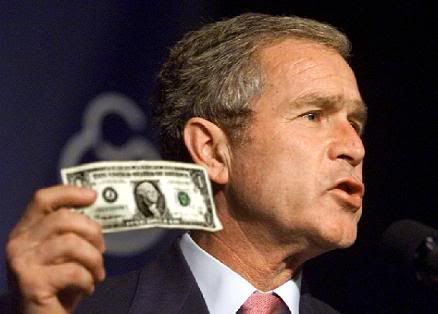
Don’t just take my word about the current situation between giant criminality and the politically connected.
[font color="green"][font size="5"]You see, there is evidence of conspiracy. An honest FBI agent warned us in 2004 about the coming financial meltdown and the powers-that-be stiffed him, too.[/font size][/font color]
The story’s below. And it’s not fiction. It is true to life.
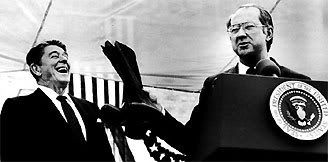
The Set-Up
You don’t have to be a fan of Paul Newman or Robert Redford to smell a BFEE rat. The oily critter’s name is Gramm. Phil Gramm. He helped Ronald Reagan push through his trickle-down fiscal policy and later helped de-regulate the nation's once-healthy Saving & Loan industry. We all know how well that worked out: Know your BFEE: They Looted Your Nation’s S&Ls for Power and Profit.
In 1999, then-super conservative Texas U.S. Senator Gramm helped pass the Gramm-Leach-Bliley Financial Services Modernization Act. This law allowed banks to act like investment houses. Using federally-guaranteed savings accounts, banks now could make risky commercial and real-estate loans.
The law should’ve been called the Gramm-Lansky Act. To those who gave a damn, it was obviously a potential disaster. During the bill’s debate, the specter of a “taxpayer bail-out” was raised by Sen. Byron Dorgan of North Dakota, warning about what had happened to the deregulated S&Ls.
Gramm wasn’t alone on the deregulation bandwagon. The law passed, IIRC, like 89-9. More than a few of my own Democratic faves went along with this deregulation, “get-government-off-the-back-of-business” law.
Today we have their love child, MOAB—for the Mother Of All Bailouts.
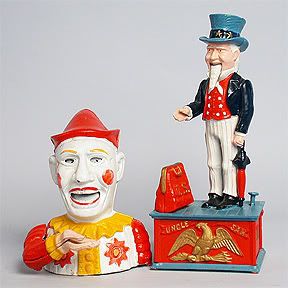
The Mark
In a sting, someone has to supply the money to be ripped off. Crooks call that person the mark or target or mope. In the present case, that’s the U.S. taxpayer.
Today’s financial crisis seems like a re-run of what happened to the Savings & Loans industry in the late 1980s. Well it is a lot like what happened to the S&Ls. Then, as now, it’s the U.S. taxpayer who gets to pick up the tab for someone else’s party.
Don’t worry, U.S. taxpayer. You’re getting something (among several things) for your $700 billion. You’re getting all the bad mortgage-based paper on almost all of Wall Street. I’d rather have penny stocks, because if there ever was something of negative value it’s the complicated notes and derivatives based on this mortgage debt.
When it comes to Bush economic policy, left holding the bag are We the People, er, Mopes. Don’t worry, it can’t get worse. As St. Ronnie would say, “Well. Yes.” You see, what the bag U.S. taxpayers hold is less than empty. It’s filled with bad debt.
The Mastermind
Chief economist amongst these merry band of thieves and traitors was one Phil Gramm (once a conservative Democrat and then an ultraconservative Republican-Taxus). An economist by training and reputation, Gramm was one of the guiding lights of Reaganomics, the cut taxes, domestic spending, and regulations while raising defense-spending to new heights. In sum, it was a fiscal policy to enrich friends – especially the kind connected to the BFEE.
Foreclosure Phil
Years before Phil Gramm was a McCain campaign adviser and a lobbyist for a Swiss bank at the center of the housing credit crisis, he pulled a sly maneuver in the Senate that helped create today's subprime meltdown.
David Corn
MotherJones.com
May 28, 2008
Who's to blame for the biggest financial catastrophe of our time? There are plenty of culprits, but one candidate for lead perp is former Sen. Phil Gramm. Eight years ago, as part of a decades-long anti-regulatory crusade, Gramm pulled a sly legislative maneuver that greased the way to the multibillion-dollar subprime meltdown. Yet has Gramm been banished from the corridors of power? Reviled as the villain who bankrupted Middle America? Hardly. Now a well-paid executive at a Swiss bank, Gramm cochairs Sen. John McCain's presidential campaign and advises the Republican candidate on economic matters. He's been mentioned as a possible Treasury secretary should McCain win. That's right: A guy who helped screw up the global financial system could end up in charge of US economic policy. Talk about a market failure.
Gramm's long been a handmaiden to Big Finance. In the 1990s, as chairman of the Senate banking committee, he routinely turned down Securities and Exchange Commission chairman Arthur Levitt's requests for more money to police Wall Street; during this period, the sec's workload shot up 80 percent, but its staff grew only 20 percent. Gramm also opposed an sec rule that would have prohibited accounting firms from getting too close to the companies they audited—at one point, according to Levitt's memoir, he warned the sec chairman that if the commission adopted the rule, its funding would be cut. And in 1999, Gramm pushed through a historic banking deregulation bill that decimated Depression-era firewalls between commercial banks, investment banks, insurance companies, and securities firms—setting off a wave of merger mania.
But Gramm's most cunning coup on behalf of his friends in the financial services industry—friends who gave him millions over his 24-year congressional career—came on December 15, 2000. It was an especially tense time in Washington. Only two days earlier, the Supreme Court had issued its decision on Bush v. Gore. President Bill Clinton and the Republican-controlled Congress were locked in a budget showdown. It was the perfect moment for a wily senator to game the system. As Congress and the White House were hurriedly hammering out a $384-billion omnibus spending bill, Gramm slipped in a 262-page measure called the Commodity Futures Modernization Act. Written with the help of financial industry lobbyists and cosponsored by Senator Richard Lugar (R-Ind.), the chairman of the agriculture committee, the measure had been considered dead—even by Gramm. Few lawmakers had either the opportunity or inclination to read the version of the bill Gramm inserted. "Nobody in either chamber had any knowledge of what was going on or what was in it," says a congressional aide familiar with the bill's history.
It's not exactly like Gramm hid his handiwork—far from it. The balding and bespectacled Texan strode onto the Senate floor to hail the act's inclusion into the must-pass budget package. But only an expert, or a lobbyist, could have followed what Gramm was saying. The act, he declared, would ensure that neither the sec nor the Commodity Futures Trading Commission (cftc) got into the business of regulating newfangled financial products called swaps—and would thus "protect financial institutions from overregulation" and "position our financial services industries to be world leaders into the new century."
Subprime 1-2-3
Don't understand credit default swaps? Don't worry—neither does Congress. Herewith, a step-by-step outline of the subprime risk betting game. —Casey Miner
CONTINUED…
http://www.motherjones.com/news/feature/2008/07/foreclo...
A fine mind for modern Bushonomics. Kill the middle class. Then, rob from the poor to give to the rich.
The Mentor
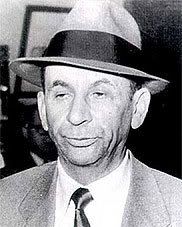
Anyone who’s ever heard him talk knows that Gramm must’ve learned all this stuff from somebody. He could never think it all up on his own. He had to have help. That’s where Meyer Lansky, the man who brought modern finance to the Mafia, comes in.
Money Laundering
Answers.com
EXCERPT...
History
Modern development
The act of "money laundering" was not invented during the Prohibition era in the United States, but many techniques were developed and refined then. Many methods were devised to disguise the origins of money generated by the sale of then-illegal alcoholic beverages. Following Al Capone's 1931 conviction for tax evasion, mobster Meyer Lansky transferred funds from Florida "carpet joints" (small casinos) to accounts overseas. After the 1934 Swiss Banking Act, which created the principle of bank secrecy, Meyer Lansky bought a Swiss bank to which he would transfer his illegal funds through a complex system of shell companies, holding companies, and offshore accounts.(1)
The term "money laundering" does not derive, as is often said, from Al Capone having used laundromats to hide ill-gotten gains. It was Meyer Lansky who perfected money laundering's older brother, "capital flight," transferring his funds to Switzerland and other offshore places. The first reference to the term "money laundering" itself actually appears during the Watergate scandal. US President Richard Nixon's "Committee to Re-elect the President" moved illegal campaign contributions to Mexico, then brought the money back through a company in Miami. It was Britain's Guardian newspaper that coined the term, referring to the process as "laundering."
Process
Money laundering is often described as occurring in three stages: placement, layering, and integration.(3)
Placement: refers to the initial point of entry for funds derived from criminal activities.
Layering: refers to the creation of complex networks of transactions which attempt to obscure the link between the initial entry point, and the end of the laundering cycle.
Integration: refers to the return of funds to the legitimate economy for later extraction.
However, The Anti Money Laundering Network recommends the terms
Hide: to reflect the fact that cash is often introduced to the economy via commercial concerns which may knowingly or not knowingly be part of the laundering scheme, and it is these which ultimately prove to be the interface between the criminal and the financial sector
Move: clearly explains that the money launderer uses transfers, sales and purchase of assets, and changes the shape and size of the lump of money so as to obfuscate the trail between money and crime or money and criminal.
Invest: the criminal spends the money: he/she may invest it in assets, or in his/her lifestyle.
CONTINUED...
http://www.answers.com/topic/money-laundering
The great journalist Lucy Komisar has shone a big light on the subject:
Offshore Banking
The U.S.A.’s Secret Threat
Lucy Komisar
The Blacklisted Journalist
June 1, 2003
EXCERPT…
In 1932, mobster Meyer Lansky took money from New Orleans slot machines and shifted it to accounts overseas. The Swiss secrecy law two years later assured him of G-man-proof banking. Later, he bought a Swiss bank and for years deposited his Havana casino take in Miami accounts, then wired the funds to Switzerland via a network of shell and holding companies and offshore accounts, some of them in banks whose officials knew very well they were working for criminals. By the 1950s, Lansky was using the system for cash from the heroin trade.
Today, offshore is where most of the world's drug money is laundered, estimated at up to $500 billion a year, more than the total income of the world's poorest 20 percent. Add the proceeds of tax evasion and the figure skyrockets to $1 trillion. Another few hundred billion come from fraud and corruption.
Lansky laundered money so he could pay taxes and legitimate his spoils. About half the users of offshore have opposite goals. As hotel owner and tax cheat Leona Helmsley said---according to her former housekeeper during Helmsley's trial for tax evasion---"Only the little people pay taxes." Rich individuals and corporations avoid taxes through complex, accountant-aided schemes that routinely use offshore accounts and companies to hide income and manufacture deductions.
The impact is massive. The IRS estimates that taxpayers fail to pay in excess of $100 billion in taxes annually due on income from legal sources. The General Accounting Office says that American wage-earners report 97 percent of their wages, while self-employed persons report just 11 percent of theirs. Each year between 1989 and 1995, a majority of corporations, both foreign- and U.S.-controlled, paid no U.S. income tax. European governments are fighting the same problem. The situation is even worse in developing countries.
The issue surfaces in the press when an accounting scam is so outrageous that it strains credulity. Take the case of Stanley Works, which announced a "move" of its headquarters-on paper-from New Britain, Connecticut, to Bermuda and of its imaginary management to Barbados. Though its building and staff would actually stay put, manufacturing hammers and wrenches, Stanley Works would no longer pay taxes on profits from international trade. The Securities and Exchange Commission, run by Harvey Pitt---an attorney who for more than twenty years represented the top accounting and Wall Street firms he was regulating---accepted the pretense as legal.
"The whole business is a sham," fumed New York District Attorney Robert Morgenthau, who more than any other U.S. law enforcer has attacked the offshore system. "The headquarters will be in a country where that company is not permitted to do business. They're saying a company is managed in Barbados when there's one meeting there a year. In the prospectus, they say legally controlled and managed in Barbados. If they took out the word legally, it would be a fraud. But Barbadian law says it's legal, so it's legal." The conceit apparently also persuaded the Securities and Exchange Commission.
CONTINUED…
http://www.bigmagic.com/pages/blackj/column92e.html
Socialize the risk for Wall Street. Privatize the loss to Uncle Sam’s nieces and nephews. Congratulations, Dear Reader! Now you know as much as Phil Gramm.
The Diversion
Still, a global financial meltdown sounds like something bad. Making things worse, we’re hearing that Uncle Sam is broke! Flat busted. Tapped out.
That’s odd, though. We the People see the Treasury being emptied with tax breaks for the wealthy and checks to the companies they own that make money off of war. Want to know how to make a buck these days? Invest in the likes of Halliburton and Northrup Grumman. Anything in the warmongering business connected to Bush and his cronies will weather the downturn or depression.
The Wall Street Journal -- a paper owned and operated by Fox News’ head, Rupert Murdoch – was very quick to promote the crisis, as DUer JustPlainKathy observed. The paper was even faster to pounce on a solution: What’s needed is a safety net for banks. And quick as a wink, they found the answer!
Only the U.S. taxpayer has the wherewithal to prevent the collapse of the global financial system -- a global economic meltdown that would freeze up credit and investment and expansion and prosperity and a return to the Great Depression. Who can be against that?
Oh. Kay. Sounds about right – Rupert the Alien agreeing with what Leona Helmsley said: “Only the little people pay taxes.”
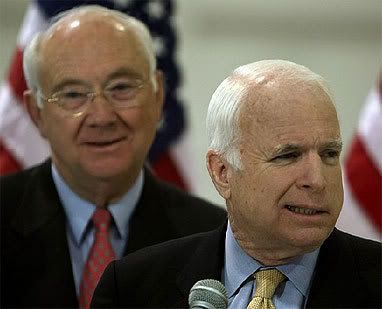
Gramm and McCain also are in favor of privatization. How nice is that?
The Getaway
George Walker Bush and his right-wing pals feel they can get away with this, their latest rip-off the American taxpayers. Who can blame them? When compared to their clear record of incompetence, lies, fraud, theft, mass-murder, warmongering and treason, what’s a few trillion dollar rip-off?

Still, it's weird how they act.
They must really think they’ll be welcomed with open arms in Paraguay and Dubai and Switzerland.
Going by the welcome the world gave the Shah of Iran, they’re in for a big surprise.
The FBI Guy
Don’t say we weren’t warned. An intrepid FBI agent with something sorely lacking in the rest of the Bush administration, integrity, blew the whistle on the bank thing…
FBI saw threat of mortgage crisis
A top official warned of widening loan fraud in 2004, but the agency focused its resources elsewhere.
By Richard B. Schmitt
Los Angeles Times Staff Writer
August 25, 2008
WASHINGTON — Long before the mortgage crisis began rocking Main Street and Wall Street, a top FBI official made a chilling, if little-noticed, prediction: The booming mortgage business, fueled by low interest rates and soaring home values, was starting to attract shady operators and billions in losses were possible.
"It has the potential to be an epidemic," Chris Swecker, the FBI official in charge of criminal investigations, told reporters in September 2004. But, he added reassuringly, the FBI was on the case. "We think we can prevent a problem that could have as much impact as the S&L crisis," he said.
Today, the damage from the global mortgage meltdown has more than matched that of the savings-and-loan bailouts of the 1980s and early 1990s. By some estimates, it has made that costly debacle look like chump change. But it's also clear that the FBI failed to avert a problem it had accurately forecast.
Banks and brokerages have written down more than $300 billion of mortgage-backed securities and other risky investments in the last year or so as homeowner defaults leaped and weakness in the real estate market spread.
SNIP…
Most observers have declared the mess a gross failure of regulation. To be sure, in the run-up to the crisis, market-oriented federal regulators bragged about their hands-off treatment of banks and other savings institutions and their executives. But it wasn't just regulators who were looking the other way. The FBI and its parent agency, the Justice Department, are supposed to act as the cops on the beat for potentially illegal activities by bankers and others. But they were focused on national security and other priorities, and paid scant attention to white-collar crimes that may have contributed to the lending and securities debacle.
Now that the problems are out in the open, the government's response strikes some veteran regulators as too little, too late.
Swecker, who retired from the FBI in 2006, declined to comment for this article.
But sources familiar with the FBI budget process, who were not authorized to speak publicly about the growing fraud problem, say that he and other FBI criminal investigators sought additional assistance to take on the mortgage scoundrels.
They ended up with fewer resources, rather than more.
CONTINUED…
http://www.latimes.com/business/la-fi-mortgagefraud25-2008aug25,0,6946937.story
We were warned and nothing happened.
Repeat: And nothing happened.
They must think We the People are really stupid. Are we supposed to believe that all that $700 billion in bad debt just happened? Where did all that money go? Who got all the money?
Meyer Lansky moved the Mafia’s money from the Cuban casinos to Switzerland. He did so by buying a bank in Miami. Phil Gramm seems to have done the same thing as vice-chairman of UBS, except the amounts are in the billions.
Who cares? He’s almost gone? Nope. That money still exists somewhere. I have a pretty good idea of where it might be. And George Bush and his cronies are poised to get away with a whole lot of loot.
Who Should Pay for the Bailout
If you are fortunate enough to be one, good luck American taxpayer! You’re in for a royal fleecing. Once the interest is figured into the bailout, we’re looking at a couple of trill.
[font size="4"][font color="red"]The people who should pay for the bailout aren’t the American people. That distinction should go to the crooks who stole it -- friends of Gramm like John McCain and George Bush and the rest of the Raygunomix crowd of snake-oil salesmen. For them, the Bush administration -- and a good chunk of time since Ronald Reagan -- has not been a disaster. It’s been a cash cow.[/font color][/font size]
The above was posted on DU on Sept. 21, 2008. (Check out the responses, lots of info from DUers.) What's changed since then? Nothing near what I'd hoped for, certainly.
Old OP: http://www.democraticunderground.com/discuss/duboard.php?az=view_all&address=389x4055207
Great memory, yours, sabrina 1! Brains + Integrity.
sabrina 1
(62,325 posts)fiction. And IF it was fiction, the good guys, those who were trying to warn us, would PREVAIL and all the crooks would be caught and spend the rest of their lives in jail.
Gramm and I believe his wife, were nothing more than crooks. In a civilized society they would have been stopped.
We WERE warned, and not just in 2004, long before that, during the Clinton years, Brooksley Borne discovered what she identified as an impending disaster and wrongly, though you can't blame HER for that, thought that if she reported it, it could be stopped. Instead she more or less run out of DC.
So many are involved, Greenspan airc, Summers and some others YELLED at her for daring to try to stop, well THEM as we know now.
That is one great post, should be in every newspaper in the country, how they did it, who did it, and mostly how they got away with it.
Lansky, Ayn Rand, American 'heroes'! I still have faith though that sooner or later they WILL be stopped, because they are getting more and more arrogant, more and more greedy, and at some point, it will be too much for them to hide and/or to handle. Maybe I'm just naive, but the truth is it cannot go on forever, history shows these kinds of crimes against the people eventually create so much anger that the people themselves simply can't ignore it all anymore.
Love your posts Octafish, they are always so filled with history and facts.
Octafish
(55,745 posts)I'm going to reincarnate the thing, for our friends on DU and throughout the blogosphere.
sabrina 1
(62,325 posts)as we are exposed to more nefariousness every day it seems. And they are clever. They KNOW how to manipulate the people. They count on the partisanship of both parties to help create amnesia in at least half the country each time an election changes parties. And that it appears, is all they need.
But I see a difference now in that at least some on both sides, are no longer blindly partisan enough to continue to close their eyes. I think THIS is what they most fear, that the people will unite. And they should.
I hope you do reincarnate this history, it seems we are always distracted by the latest shiny object.
And I meant it, you are one of my favorite and most informative DUers. ![]()
octoberlib
(14,971 posts)I've always said that Free Market Libertarianism and Democracy are incompatible.
octoberlib
(14,971 posts)Gravitycollapse
(8,155 posts)octoberlib
(14,971 posts)I throw that word around a lot. Like others do fascist. I find his economic theories selfish and abhorrent.
Gravitycollapse
(8,155 posts)He was wrong on many things. But he was not a sociopath by any measure I can conceive.
woo me with science
(32,139 posts)Sounds like the typical propaganda tactic of trying to put people with complex views into partisan boxes in order to summarily discredit them.
What level of fascism are you comfortable with?
octoberlib
(14,971 posts)any level of fascism. I sure the fuck know that I'm living in a state with a Governor and budget director who revere Hayek and they have proceeded to tear this state apart enacting policies which are disastrous for the poor and middle class while ensuring that the corporations and the rich pay no taxes. They're all sociopaths. Fuck them.
hughee99
(16,113 posts)to control the "democracy".
malaise
(268,913 posts)Sachs proved that he was chatting rubbish in that serfdom shite book.
Yep Hayek and Friedman and that crap neo-liberalism is the worst thing that happened to humanity in centuries.